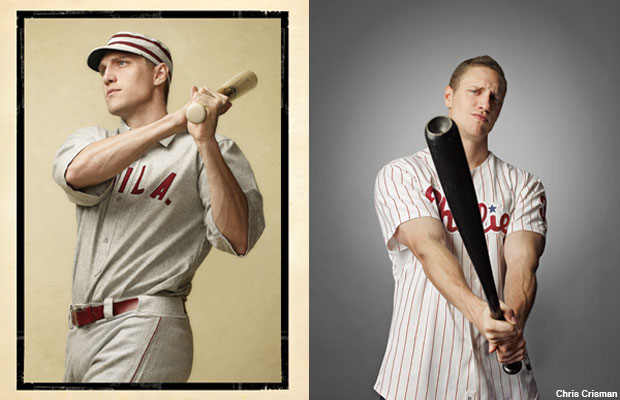The Old-School Passion of Hunter Pence

Hunter Pence wants to please.
He’d like to accommodate the request, he really would, it’s just that he’s not sure about entering a room full of men and women he’s just met, only to immediately whip off some of his clothes and stand around bare-chested while everyone gawks and snaps photos—which is, ironically, exactly what he did shortly after being traded from Houston to Philadelphia last season. During a memorable charity fashion show held by new teammate Shane Victorino, Pence went all Right Said Fred on the catwalk, ripping off his t-shirt and firing it into the stunned crowd. It was a ballsy thing to do—to bare so much, so soon, to a community that has leveled athletes with far more tenure for far less dodgy displays. One quick swing of Philly’s well-dented criticism wrecking ball and Pence could have ended up on the he’s-not-our-type rubble pile, along with so many other players.
[See exclusive video of Hunter Pence on CSNPhilly.com]
It didn’t go that way, of course. The fans loved it. The media loved it. Everyone seemed to love it. But that was different, Pence says. That was a lark. That was something to make his new teammates, who were peeking out from behind the curtain and cackling like they’d just been dosed with nitrous, laugh with him and at him. That was, as Pence says—and is—a goof. This? This is a magazine photo shoot in a windowless room of the Citizens Bank Park basement. Even though the art director would like to piggyback on that unforgettable half-Monty moment, Pence will pass. “I’m sorry, guys,” he says. “I just can’t do it.”
He apologizes several times. But after he dons a gray throwback Phillies uniform made from what appears to be super-scratchy Civil War-era surplus wool, the shoot literally starts to click. By the time it’s over, there are hugs and back-claps. It’s as though Hunter Pence has suddenly become the mayor of a very small town.
That Pence could so easily win over so many people makes sense, if only because that’s precisely what he did upon arriving in Philly. How he did it, on the other hand, is much harder to figure. It can be difficult to determine who’s a Philly guy and who isn’t. Hustle and grit and talent help, but aren’t guarantees of approval. There’s no pattern or formula to who is and isn’t rejected here. Just know, as you almost certainly do, that Pence was accepted so quickly and completely that he might have set some sort of record for a town that makes it a point of pride not to swoon for a player until a proper vetting process—which usually includes a few swift kicks to the ego—is complete.
With Pence, there was none of that. A short film about his time in the Phillies uniform thus far would go something like this: He came to Philly. He hit the ball. He went to eat. The fawning populace drooled. Fin.
Even more remarkable is that the lead actor in this feel-good drama hails from Texas. Pence was born in Fort Worth and played his high-school and college ball in Arlington, a short drive west on I-30 from Dallas, a city Philadelphians have long been conditioned to loathe. And before coming to Philly, Pence had only played professionally in Houston. Remarkably, his background doesn’t seem to matter. You get the sense that he could mosey around Rittenhouse Square with spurs sparking the sidewalk and Phillies fans would still beg him for a quick photo.
“The spirit of Philadelphia, I didn’t understand it until I got up here,” he says. In Houston, his former teammate Michael Bourn, who’d played for the Phillies, once said to him, “Man, if you played for Philly, they would love you.” Pence asked him why.
“I don’t know,” Bourn replied. “They just would.”


